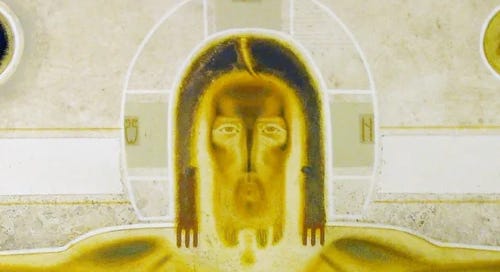Easter Hope is Not Inert
God gives us the endurance to oppose those things we cannot accept with revolutionary patience in Jesus Christ
1 Peter 1:3-9
Friedrich Nietzsche said the fatal problem with Christianity is that there has only been one real Christian in human history and that He had died on the cross.
David Bentley Hart writes that when he finished translating the New Testament the work left him with a deep sense of melancholy along with the suspicion that most of us who go by the name “Christian” ought to give up the pretense of wanting to be Christian.
Notice the distinction. He didn’t say we should give up the pretense of being Christian. He said we should give up the pretense of wanting to be Christian.
He asks:
“Would we ever truly desire to be the kinds of people that the New Testament describes as fitting the pattern of life in Christ?”
And before you answer, consider the new way of life Christ gave his community to live.
Christ gave us a new way to deal with offenders.
By loving them.
Christ gave us a new way to deal with violence.
By suffering.
Christ gave us a new way to deal with sinners.
By eating with them.
Christ gave us a new way to deal with money.
By sharing it.
Christ gave us a new way to deal with debt.
By forgiving it.
Christ gave us a new way to deal with enemies.
By dying for them.
Christ gave us a new way to deal with a corrupt society.
By embodying the New Age not smashing the Old.
This is why, as St. Luke reports without embarrassment or hedging, after Easter, the price to become a Christian was that you sell all your property and possessions, distribute the proceeds to the poor, and then rely on the mutual support of the community for your needs. Barnabas, for example, on becoming a Christian, cashed in his 401K and handed over all the money to the body of Christ.
Just imagine, the character a community would need to exemplify in order for a stranger to trust it with all of their needs.
For the earliest generations of Christians, the Church was an alternative community with no Second Generation members, for it grew not through the family but by witness and conversion. Christians were the alternative Christ had made possible in the world through his death and resurrection.
Thus, Hart notes, the first Christians were:
“A company of extremists, radical in their rejection of the values and priorities of society not only at its most degenerate, but often at its most reasonable and decent.
They were rabble, a disorderly crowd.
They lightly cast off all their prior loyalties and attachments: religion, empire, nation, tribe, family and safety.”
They did so, Hart argues, because one thing that is in remarkably short supply in the New Testament is common sense. The Gospels, the Epistles, the Book of Acts, Revelation—all of them are “relentless torrents of exorbitance and extremism” in which “there are no comfortable medians, no areas of shade, for everything is cast in the harsh and clarifying light of Christ’s returning reign.”
Everything is cast in the harsh and clarifying light of Christ’s return.
In other words, the communities of the New Testament exemplify life lived according to the future, life lived as citizens of a Kingdom not yet here but near.
To be the kinds of people the New Testament affirms, David Hart concludes in his preface to the New Testament, we would have to become strangers and exiles— sojourners on the earth.
According to the Second Sunday of Eastertide, this is exactly who God has already made us in Jesus Christ:
Keep reading with a 7-day free trial
Subscribe to Tamed Cynic to keep reading this post and get 7 days of free access to the full post archives.




